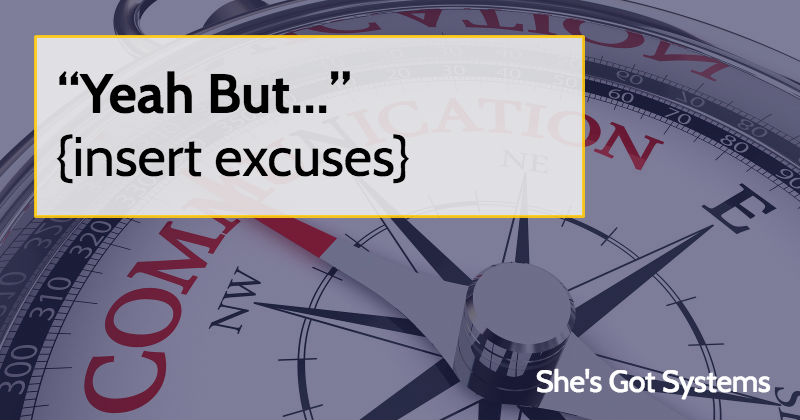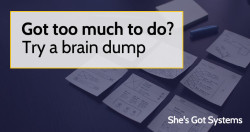It’s a true fact that we can more easily see the issues that other people have in their businesses than in our own. And recently I was able to hear great business and marketing advice given to dozens of people but the most common response was a dismissive “yeah, but” followed by an excuse.
- Yeah, I could narrow my niche but I really don’t want to leave out that group.
- Yeah, I should be raising my prices but clients will get mad at me.
- Yeah, I know implementation will make me money but if I don’t supervise that employee they’ll screw up.
It’s an incredibly hard thing to hear your own “stuff” but every time an excuse pops up, it’s like a starving man standing at a buffet of choices and choosing not to eat.
{Side note: how exactly do you get out of agreeing with someone giving you genuinely horrible or misguided advice? Simply repeat this phrase: “Thank you for sharing that, I’ll have to give it some thought.” And then change the subject.}
Why do we do this? Isn’t advice a good thing? There are a few common reasons.
Talk is cheap and most advice is free so it’s worthless
So if you don’t do the thing they think you should do, there’s no impact and we often think that means the advice is meaningless.
Listen.
Some of the best advice I’ve received, about my business or otherwise, has come from people who had nothing to gain. Who told me the truth from where they stand in honesty and kindness and without an alterior motive.
Talk might be cheap, but qualified advice from someone who wants to see you succeed it priceless. It may be the culmination of their professional experience and drawing on years and years of trial and error. Don’t automatically discount advice that you didn’t paid for.
“I’ve got a legitimate concern. Are you saying I shouldn’t speak it?”
While there are some situations where, to keep the peace, you’ll just quietly agree and do whatever you want later (hey, Thanksgiving is coming up so just giving some family survival techniques!), in business it’s absolutely alright to voice your concerns.
As in most things, it’s how you go about doing it that matters. Here’s a scenario:
“You should blog weekly to get out fresh content to your audience.”
“Yeah but I’m not always motivated.”
“If consistency is a problem, maybe write a few articles ahead so you have a buffer.”
“Yeah, I know I could but I’ve got so much else to do.”
“I give up.”
Let’s do the same short scenario with the same basic reasons but change the language:
“You should blog weekly to get out fresh content to your audience.”
“I have heard that. One thing I struggle with is staying motivated each week. What would you suggest?”
“If consistency is a problem, maybe write a few articles ahead so you have a buffer.”
“Okay, that makes sense. I want to make the most of my time and stay efficient, would you simply power through and do them all in a week or is there another method you like?”
“Actually when I’m busy and can’t write, I dictate bullet points or a story to my VA and have them draft the article for me to edit. I find that saves time.”
Already, I like the fictional person in example 2 way more than the whiner in example 1.
Knowing what to do is only half the battle
If you’re often frustrated with advice that tells you the end goal, get in the habit of asking this one simple question:
“That sounds great, how do you suggest I get started?”
Now I tacked on the intro because if you just blurt out “how do I do that?” it might come across as bossy or demanding. Instead, ask with genuine curiosity and find out the first 1 or 2 steps someone else might take so you have a starting point.
There’s nothing wrong with deciding advice isn’t a good fit, but please, don’t become a “yeah but”-er because eventually you’ll stop getting advice, the people tired of excuses. Take action, be gracious when someone is using their wisdom to help you and stay thankful.
Action Step: What was a piece of advice you heard recently that you can begin to implement in your life or business?
(Bonus step: reach out to the person who gave you that advice and tell them you’re going to try it. And say ‘thank you.’)

 Plancrastination is destroying your business
Plancrastination is destroying your business Projects, Procrastination and Performance
Projects, Procrastination and Performance Got too much to do? Try a brain dump
Got too much to do? Try a brain dump